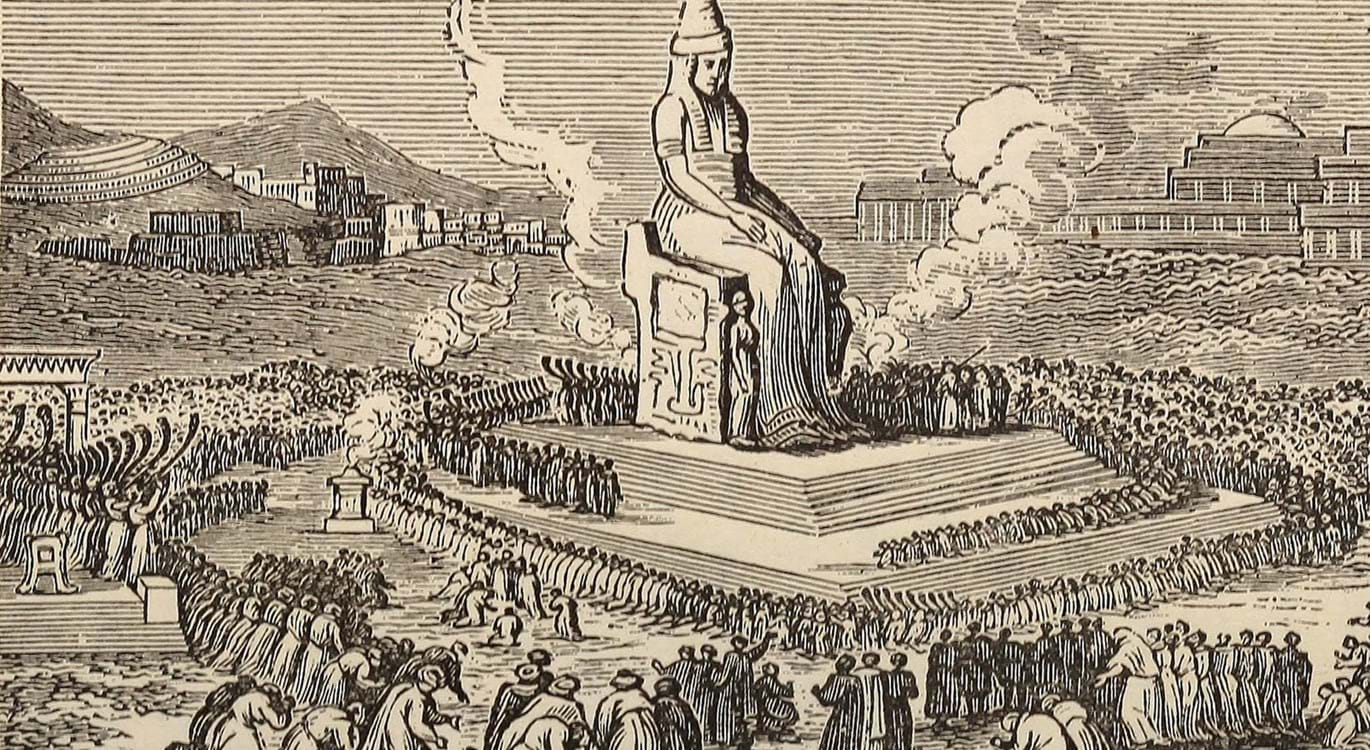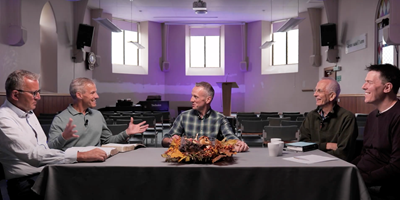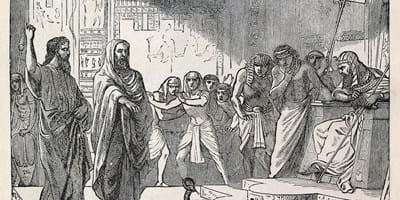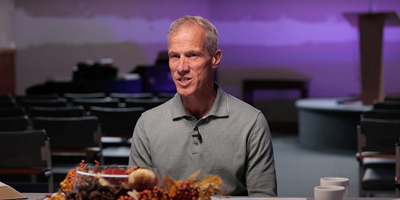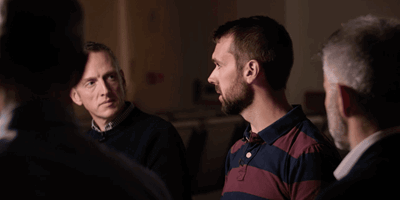In Daniel chapter 3, we read of the choice facing three young men with high-powered jobs in the government of the dominant super-power. Should they bow down and worship the gold idol that had been set up by the monarch? If they did, they would retain their jobs, their influence and most importantly their lives. However, in doing so they would be violating God’s law (Leviticus 26:1), by pledging their ultimate allegiance to something other than the one true God. If they did not bow down the warning was very clear, “Whoever does not fall down and worship shall be cast immediately into the midst of a burning fiery furnace.” (Daniel 3:6).
When Jerusalem was conquered by the Babylonians, Shadrach, Meshach and Abednego had been transported from their homes to a foreign city with a totally different culture. The intention was that they would be immersed into a different way of thinking. But the attempt to indoctrinate the young men into Babylonian thought was resisted by the young men who were resolved to be obedient to the one true God. Early in the indoctrination process they refused to compromise and eat food that would defile them (Daniel 1:8). Just as any victories in faithfulness strengthen the Christian for future tests, so their first steps of faithfulness equipped them for a far greater test.
When the call to worship at a gold statue came and people all around them bowed down to worship, the three young men did not (Daniel 3:7). They made a choice, with serious repercussions, that showed where their loyalties lay. How were they able, by their actions, to make such a courageous and bold statement? What lessons can Christians learn from their example?
There are three principles that we can learn from:
1. They knew there was something more than this world
In Daniel chapter 2, we can read that King Nebuchadnezzar had a troubling dream, given to him by God. The content and interpretation of the dream was provided by Daniel (Daniel 2:31-45). By God’s enabling, Daniel was able to inform King Nebuchadnezzar about the future of this world, that had been shown to him in a statue made of a variety of materials. He was the head of the Babylonian empire, represented by a gold head. This authority had been given to him by God but it would not be everlasting as there would be a succession of empires (Medo-Persian, Greek and Roman) that would finally be replaced by the Kingdom of God.
“And in the days of these kings the God of heaven will set up a kingdom which shall never be destroyed; and the kingdom shall not be left to other people; it shall break in pieces and consume all these kingdoms, and it shall stand forever.” (Daniel 2:44).
Shadrach, Meshach and Abednego had their faith reinforced and strengthened when they heard God’s word about future events. They understood that the empires of this world would not last and although they were to be responsible, hard-working and respectful citizens their real citizenship was in heaven. As citizens of the Kingdom of God they knew, by faith, that their future was assured and secure.
Knowledge about the future empowered them to live uncompromisingly in the present. Likewise, the study and knowledge about future events should have an impact on how the Christian can live a godly life in an ungodly world.
"Knowledge about the future empowered them to live uncompromisingly in the present."
2. They regarded loyalty to God above their own welfare
Like everyone else Shadrach, Meshach and Abednego had a set of values which would dictate how they lived their lives. Whatever is of absolute value to us will dictate how we live. If we believe that our own welfare is the most important thing, then our decisions on what to do and what not to do in life will be determined by that belief.
If Shadrach, Meshach and Abednego had believed that their own welfare was of primary importance, they would have sought to preserve their life by joining with the multitudes who bowed down to the gold statue. Even though they did not succumb in this test it is highly likely that the three young men would have suffered a great degree of anguish as they considered the cost of their loyalty. We do not have any details on the mental and emotional agonies they suffered before the day came when they stood out from the crowd by not bowing down. But we do know that loyalty to God in an ungodly culture is never easy – but it does form godly character.
Not every Christian will face the ultimate test between loyalty to God and losing their own life. Yet all of us will regularly make decisions based on our own value system. If we value our own comfort above loyalty to God then we will never share the gospel with an unbeliever, in fear that we may appear offensive. We will never speak against an ungodly culture that promotes sexual immorality, if we value our own popularity and desire to be liked above loyalty to God.
The Lord Jesus gave clear and uncompromising instructions for all who would be His disciples.
"If anyone comes to Me and does not hate his father and mother, wife and children, brothers and sisters, yes, and his own life also, he cannot be My disciple. And whoever does not bear his cross and come after Me cannot be My disciple.” (Luke 14:26-27).
The heart of the gospel message is that eternal life is a gift from God that cannot be earned and is not deserved. However, that does not mean that Christian life is without cost. The confession that ‘Jesus is Lord’ means that our love for and devotion to the Lord Jesus must be so great that all other loves, even of our own lives, seem to be hatred by comparison.
3. They trusted in God but did not presume on Him.
When it was noticed that the three young men did not bow down, they were brought before the King and given one more chance to save their own lives by bowing down to the gold statue. We can only imagine the tension in the court as all eyes focused on them, awaiting a reply. The statement they made, under great pressure and with such high stakes, is a model of absolute trust in God and a demonstration of their own values in action.
“O Nebuchadnezzar, we have no need to answer you in this matter. If that is the case, our God whom we serve is able to deliver us from the burning fiery furnace, and He will deliver us from your hand, O king. But if not, let it be known to you, O king, that we do not serve your gods, nor will we worship the gold image which you have set up." (Daniel 3:16b-18).
They knew that God could save them from being burned to death but they did not presume that He would. They spoke with respect to the King who was threatening to end their life on earth but they were trusting in God, who has the ultimate power.
Against such men King Nebuchadnezzar had limited power. Even if their lives on earth were cut short they knew they would go to be in the presence of God. God had given them the needed grace at the needed time to be able to stand firm in their loyalty to Him. In Daniel 3:23-27, we read how God miraculously kept them safe – not from the fire, but in and through the fire.
This trial had certainly strengthened and deepened their faith in God. The development of character and the strengthening of faith occurs when the believer, in the midst of trials, remains loyal to God and shows the reality of what is of ultimate value to them. Many years after Shadrach, Meshach and Abednego faced the fiery furnace the apostle Peter wrote to believers, who faced different trials.
“that the genuineness of your faith, being much more precious than gold that perishes, though it is tested by fire, may be found to praise, honour, and glory at the revelation of Jesus Christ,” (1st Peter 1:7).
The genuineness of faith can be proved only by fire. In times of comfort and ease it can be easy to be a Christian but in times of trial the reality of faith is tested. The great assurance that the believer has is that genuine faith will result in praise, honour, and glory when Jesus Christ is revealed.
Conclusion
It has never been easy to live for God in an ungodly world. Nor was it ever intended to be. The example of Shadrach, Meshach and Abednego has been provided so that the believer might learn from it and apply the same principles in their life.
“For whatever things were written before were written for our learning, that we through the patience and comfort of the Scriptures might have hope.” (Romans 15:4).


